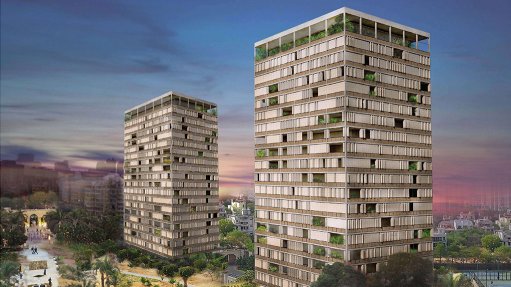
Artist's impression of a resilient urban community
An idea to retrofit existing buildings in African cities with three-dimensional (3D) printed porous insulation panels to improve liveability and reduce energy consumption for cooling and ventilation has been named the African winner of the Cities for our Future challenge run by the Royal Institution of Chartered Surveyors (RICS).
The idea is now on the global shortlist of 12 ideas, narrowed down from 1 200 entries, with the overall winner to be announced in November.
With peak shade temperatures of more than 40 ˚C becoming more common in African cities, the need to artificially cool and ventilate buildings is consuming more energy and increasing stress on already stretched energy generation and distribution infrastructure.
The innovation, proposed by Heat Island, a multidisciplinary design team of eight members from the UK, is a flexible retrofitting process in which the passive thermal regulation and overall resilience of existing buildings can be improved, while leaving existing homes and communities in place.
A flexible and inhabitable ‘wrapper’ around the existing facade passively cools the structure using radiant cooling of the existing concrete frame during the night and evaporative cooling of the interior during the day.
The system, named Evaporos, uses moveable 3D printed porous ceramic panels to enable the facade-wrapper to ‘close down’ during the heat of the day, and to open up fully at night. This diurnal cycle increases thermal comfort, while reducing energy consumption and removing the need for mechanical cooling and ventilation.
RICS is running the competition to encourage young people around the world to think about the challenges facing the world’s cities and to draw upon their imagination and innovative ideas to create real, practical solutions that global cities can implement.
Heat Island team leader Joseph Augustin said as peak temperatures across Africa and the world continue to rise, there is a major need for cooling solutions which avoid creating additional energy load. Evaporos is a response to the specific problem of already existing buildings, as well as an opportunity to enhance public space and social infrastructures in arid megacities.
“With three-million people moving to cities every week, the rapid expansion of urban areas the world over is putting ever more strain on infrastructure and services. Many city dwellers live in slums or poor-quality housing or have to contend with poor air quality and inadequate transport links,” he added.
The next step in the Cities for our Future competition run by RICS, in partnership with the United Kingdom National Commission for the United Nations Educational, Scientific and Cultural Organisation and the Association of Commonwealth Universities, will see each of the 12 finalists given a RICS mentor to help them develop the idea in advance of the final judging in November.